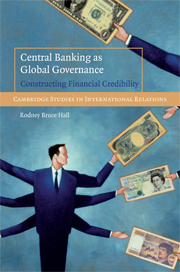Book contents
- Frontmatter
- Contents
- Preface
- 1 Central banking as governance
- 2 The social character of money
- 3 Instituting facts and constituting rules
- 4 Constitutive power relations
- 5 Rules and international monetary systems
- 6 Central bank independence as credibility
- 7 Transparency and intersubjectivity in central banking
- Bibliography
- Index
- Cambridge Studies in International Relations
- References
2 - The social character of money
Published online by Cambridge University Press: 03 May 2010
- Frontmatter
- Contents
- Preface
- 1 Central banking as governance
- 2 The social character of money
- 3 Instituting facts and constituting rules
- 4 Constitutive power relations
- 5 Rules and international monetary systems
- 6 Central bank independence as credibility
- 7 Transparency and intersubjectivity in central banking
- Bibliography
- Index
- Cambridge Studies in International Relations
- References
Summary
Men of business in England do not…like the currency question. They are perplexed to define accurately what money is: how to count they know, but what to count they do not know.
Walter BagehotAlthough economic theory has a good deal to say about the role the money plays in the economy, it remains uncomfortably vague about the appropriate definition of money.
Mervyn KingTHE BUCK STARTS HERE
Plaque in the office of former US Fed Chairman GreenspanCentral banking has developed an enormous mystique in recent years in no small measure because central bankers are widely believed to have a monopoly of the power to create the money supply of the nation, “and ultimately the power to create is the power to destroy.” Once exclusively within the power of sovereigns, money is now created and destroyed by central banks, and the mechanisms by which they do so will be elaborated in this chapter. They do so largely with the assistance of two technical mechanisms whose social character will also be elaborated, as it is the social character of money, its generation, and its destruction, and the manner in which this generation and destruction arises from social processes, that interests us.
Contemporary economic thought on the nature of money, and to a significantly lesser extent contemporary practice within the central banking profession, subscribes to the commodity theory of money.
- Type
- Chapter
- Information
- Central Banking as Global GovernanceConstructing Financial Credibility, pp. 14 - 44Publisher: Cambridge University PressPrint publication year: 2008



